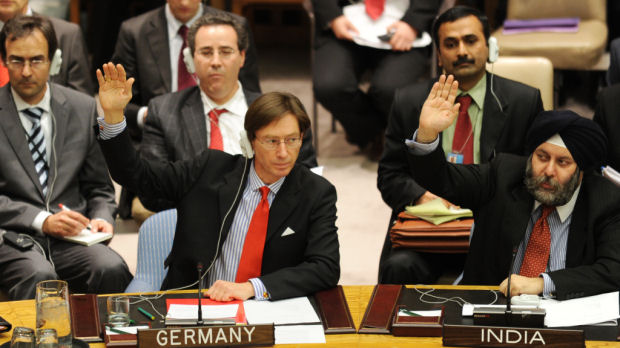UN’s Libya vote: who voted for what
There was a split between the UN Security Council’s permanent members when they came to vote on a Libyan no-fly zone resolution. So who voted for what – and why?

The UK, France, and the United States – major partners in the UN push to secure a no-fly resolution on Libya – have all been wrong-footed by recent events in the Arab world.
The UK scored several own goals when the political turmoil in north Africa moved on from Egypt to Libya. As early as 21 February, Foreign Secretary William Hague suggested Colonel Gaddafi was on his way to Venezuela. Two weeks later, six special services operatives and two Foreign Office officials were detained by rebels in eastern Libya.
Meanwhile, the prime minister, David Cameron, was criticised in some quarters for the apparent cynicism with which his visit to Egypt’s Tahrir Square had been bolted onto a trade visit to Middle East countries – a tour on which he was accompanied by eight representatives from the UK’s defence industry.
Turmoil in Tunisia prompted the sacking of France’s foreign minister for her links with the regime of ousted President Ben Ali.
Nor was it plain sailing across the Channel. The turmoil which kicked off in Tunisia prompted the sacking of Michele Alliot-Marie, France’s foreign minister, for her links with the regime of ousted President Ben Ali.
And last week the Elysee Palace wrong-footed other EU countries – and, temporarily, members of France’s own government, including Foreign Minister Alain Juppe – by becoming the first country to recognise the anti-Gaddafi Libyan rebels.
Critics accused French President Sarkozy of diplomatic showboating. At the same time, France became cheerleader for the imposition of a no-fly zone over Libya.
The United States left it until the middle of this week to jettison its opposition to a no-fly zone. Defence Secretary Gates and Admiral Mike Mullen, head of the US armed forces, have both questioned the effectiveness of a no-fly zone. Arab League support for the proposal is thought to have been a major factor in bringing round the Obama administration.
Representing the Arab League, Lebanon joined the UK, France and the US in drafting the no-fly resolution that was passed at the UN Security Council on 17 March. Last Saturday the Arab League, meeting in Cairo, voted in favour of a no-fly zone.
Germany’s objections are that action in Libya could fail, that the conflict could widen, and that many could lose their lives.
Historically, Lebanon has close ties with France. But Libya-Lebanon relations were also clouded by the disappearance in 1978 of influential cleric Imam Musa-al-Sadr, allegedly murdered by Libyan agents.
Germany, a non-permanent member of the UN Security Council since the start of 2011 and another close ally of France, has attracted criticism from some quarters by its decision to abstain from voting. Critics have noted that the country has excluded itself from an action that requires solidarity above all things.
What is more, German Foreign Minister Guido Westerwelle has stated no German forces will participate in military action in Libya. Instead, he has called for tougher sanctions against Colonel Gaddafi’s regime. Germany’s objections, as detailed by the country’s UN ambassador Peter Wittig, are that action in Libya could fail, that the conflict could widen, and that many could lose their lives.
China’s UN ambassador, Li Baodong, said his country had “serious concerns” with parts of the resolution, while stressing the importance China attaches to the position of the Arab League. Russia’s Vitaly Churkin was less equivocal, describing the vote as “most regrettable” and calling for an immediate ceasefire in Libya.
Critics of the UN vote point out that the members who abstained – China, India, Russia, Brazil and Germany – include three of the five most populous nations in the world and account for nearly half of the world’s population. If the operation in Libya continues for an extended period, the lack of unity among UN members will undoubtedly be tested.